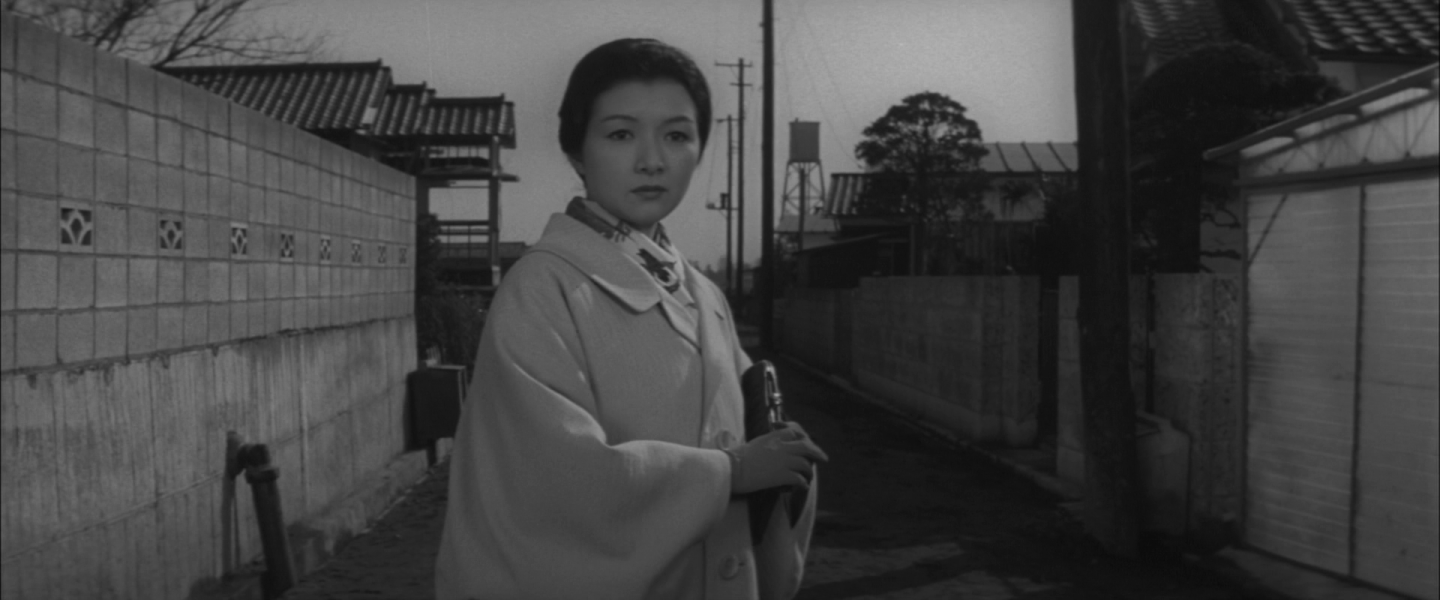The Wiser Age (1962) Movie Review: Picture this: an aging patriarch of a family falls terribly ill, and his children reconvene at his house to tend to him. They reveal the layers, secrets, and troubles of their complex family dynamic during their time together. It’s the premise on which great family dramas are built, set in Tokyo, and the first film that naturally comes to mind is Yasujiro Ozu’s Tokyo Story (1953). The film is the gold standard in exploring the naturalistic drama of a Japanese family. Tokyo Story is rich with the theme of tradition versus modernity, the expectations, and differences between gender roles, as well as the sadness of the passage of time.
The Wiser Age, however, is a lesser-known film in Naruse’s catalog. Starring Naruse’s muse, Hideko Takamine, the film is allowed the freedom to bask in that Ozu-styled narrative. It may seem reductive to discuss Ozu’s seminal classic in a review regarding a Mikio Naruse film, despite their shared affinity in exploring the ailing troubles of post-war Japan during their time as peers. After all, Naruse is an accomplished auteur in his own right. Yet the comparison point, particularly in regards to Ozu’s far better-known brand of cinema, allows us to see what makes Naruse’s exploration of the same a testament to his skill and style. His version works mostly as he enables the writing to take control of the material, crafting a more standard dialogue-based drama.
The best example of this is in the opening. The inciting incident is instantly waved off, as the father’s predicament isn’t much of a concern. Almost all the children have arrived for the visit; the economic writing establishes their selfish and prideful natures in contrast to the family’s widowed daughter-in-law. There isn’t room to defy these notions or bask in the setting. The outside world and its changes are also a direct challenge to the family, whose large ancestral home, including a shop, is threatened by new road and property developments.
Dialogue isn’t necessarily confrontational, yet it allows snippets of revelations through the screenplay that texture the precisely characterized players with enough nuances. In many ways, it seems like a reactionary piece to Tokyo Story’s black-and-white depiction of the generational divide. Yet, as the screenplay further unravels, it is essential to note that Naruse and writers Toshiro Ide and Zenzo Matsuyama cannot quite decide whether they want to live with that interpretation or provide a sharp moral lesson to the audience.
Still, in the languid moments where they explore these nuances, The Wiser Age indeed rises to be of value within Naruse’s iconic filmography. The film’s title, including its second one, “A Woman’s Place,” plays a profound role in understanding these realistic details and depictions.
This is especially true as Naruse and the screenwriting delves into his favorite subject matter, the unending plight of the Japanese woman caught between tradition and modernity. The relationships, particularly between the women, find a great nuance when we realize that the father, Kinjiro’s (Chishu Ryu; an Ozu regular) current wife Aki (Haruko Sugimura), is his second wife, mother only to the younger siblings Natsuko (Yoko Tsukasa) and Hoshi (Ishikawa Yukiko) who are of marriageable age. The couple’s eldest daughter, Michiko (Keiko Awaji), arrives later with her incompetent husband, with their own share of secrets and troubles in need of help.
The complete picture is painted with care, especially in the divided conflict between the younger and older children from the previous marriage. Jiro (Keiju Kobashi), the remaining son, has his own family troubles to sort out, with a third child coming and desires to inherit his father’s property. Matsuyo (Aiko Mimasu), the eldest daughter, has her grasp on this property, ironically with no control over her philandering husband and flirty daughter.
The first family’s chief instigator of familial tension is Umeko (Mitsuko Kusabue), the fiercely independent youngest child. Her refusal to get married and eventual failure in a romantic relationship is where Naruse finds space to deliver some potent melodrama. That romantic relationship is fostered with the enigmatic Musumiya (Akira Takarada), Aki’s son from her first marriage. As is the tradition in Japan, after her controversial divorce, Aki was forced to abandon her son to her husband and his family. His presence raises tensions, especially as he makes overtures to both Umeko and the family’s docile daughter-in-law, Yoshiko (Hideko Takamine).

The conflict allows Naruse to explore the shifting dynamics within a traditional household, especially in relation to gender roles and rigid rituals. Yoshiko herself is pressured to keep her son Ken (Kenzaburo Osawa) in line, mainly regarding his education. Her ties to the family can only exist if and when Ken is able to be the man of the house. The parallels to Aki’s own domestication in a new house and frayed relationship with her son explore how these roles affect not only the women but also the men.
With a measured pace, it’s the cutting that truly carries the weight in using irony and comedy effectively to understand these dynamics. For example, as the elders discuss the marriage of the younger girls, the girls playing in a children’s playground undercut the somber mood. It showcases how differing the views between the generations are, but also the unjust manner in which important aspects of life, especially for women in Japanese society, are dealt with.
In response, the film also looks at the burdensome characters of the women’s husbands and prospects through the lens of their defined roles. It is wholesome to see the men, especially Michiko’s husband, react freely until his wife or mother-in-law puts him in his place. The pressures of masculinity are never overlooked, with Ken playing the most prominent part. Yoshiko understands her duties within the family; outside of it, she remains curt, especially towards Musumiya and his affections (unsure of their authenticity). Her focus remains on Ken, yet that same straightforwardness coupled with blind love truly rattles the young man. The pace and edit explore the vast nature of conflicts within each pocket family of the larger family. Meanwhile, Ken’s own failures and struggles in his education appear at the fringes of the domestic strife.
The women, especially the younger ones, who can possibly relate, are focused on their love lives and potential suitors. The elders urge Ken to continue striving for excellence, but the generation gap and their thinking are unable to relate to his pressures. The film captures confining spaces to match the confining laws of society that govern the gender roles in Japan. All of these rules confine the characters in their miserable situations.
Unfortunately, Ken, of all people, finds a twisted path to freedom by killing himself. In an ironic twist to the climax of Tokyo Story, Naruse explores the tragedy of the generation gap with the death of one of the youngest characters as opposed to the older ones. It is here, though, that the screenplay loses some of its effectiveness. The climactic funeral sequence allows the writers to bring these characters full circle as we witness their selfish natures resurface to the forefront. The children cannot help but discuss their own predicament in light of the passing of their nephew, focused instead on ancillary troubles rather than perhaps showcasing a shred of empathy for Yoshiko.
Yoshiko, too, is left to lament her own freedom from a confining role as the daughter-in-law of this house now that her only tie to the family no longer exists. It displays the woeful existentialism caused by the outmoded code of society regarding a woman’s place (the title rears its ugly head.). That simplicity, especially the matter-of-fact cruelty of the family’s children, is a great dramatic payoff, especially in the film’s final scene. This is even though we’ve spent a great deal of conversations making these selfish characters’ own troubles feel realistic and emotional.
As they discuss their right over the family property, we witness Yoshiko and her in-laws searching for a better space for themselves, detached from the selfishness of their loved ones. Naruse pointedly ends on the children’s children playing their games on the land, perhaps once again a sharp cut of humor to underline that each generation gives way to the next whether they wish to or not. Cinematically, none can match the focused prowess of Ozu’s storytelling, especially with Tokyo Story, but Naruse makes a bold attempt with sincerity. Overall, The Wiser Age fails and succeeds because it is willing to explore deeper yet not rankle the chains of conventional philosophy.



![Badhaai Do [2022] – Ending and Themes Explained](https://79468c92.delivery.rocketcdn.me/wp-content/uploads/2022/02/Badhaai-Do-2022-768x432.jpeg)
![Brazen [2022] Netflix Review: A Disaster Fest that Never Amounts to Anything](https://79468c92.delivery.rocketcdn.me/wp-content/uploads/2022/01/Brazen_Unit_04905_R-768x511.jpg)
